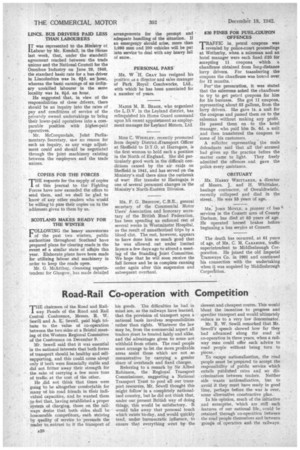Road-Rail Co-operation with Competition
Page 22

If you've noticed an error in this article please click here to report it so we can fix it.
THE chairmen of the Road and Railway Panels of the Road and Rail Central Conference, Messrs. R. W. Sewill and A. E. Sewell, paid high tribate to the value of co-operation between the two sides at a Bristol meeting of the Western Regional Committee of the Conference on December 9.
Mr. Sewell said that it was essential in the national interests that both forms of transport should be healthy and selfsupporting, and this could come about only if both were financially stable and did not fritter away their strength for the sake of carrying a few more tons of traffic at the cost of the other.
He did not think that times were going to be altogether comfortable for many of his road friends in their individual capacities, and he wanted them to feel that, having established a proper system of charging, those on the railways desire that both sides shall be honourable competitors, each striving by quality of service to persuade the trader to entrust to it the transport of his goods. The difficulties he had in mind are, as the railways have learned, that the provision of transport upon a national basis involves responsibilities rather than rights. Whatever the law may be, from the commercial aspect all traders must be treated fairly and alike, and the advantages given to some not withheld from others. The road people mast arrange to let the more profitable areas assist those which are not so remunerative by carrying a greater share of overheads and fixed charges.
Referring to a remark by Sir Alfred Robinson, the Regional Transport Commissioner, suggesting a National Transport Trust to pool all our transport resources, Mr. Sewell thought this might follow in a completely nationalized country, but he did not think that, under our present British way of doing things, this would be satisfactory. -It would take away that personal touch which exists to-day, and would quickly tend, under bureaucratic influence, to ensure that everything went by the
slowest and cheapest routes. This would blunt the incentive to progress and speedier transport and would ultimately -reduce us to a very low denominator. Mr. ft. W. Sewill remarked that Mr. Sewell's speech showed how far they had advanced along the road of co-operation in three years, when a railway man could offer such advice to road people without being torn to pieces.• •
To escape nationalization, the road people must be prepared to accept the responsibility of public service which entails published rates and no diicrimination between traders. Neither side wants nationalization, but to avoid it they must have ready in good time, perhaps before the war is over, some alternative constructive plan.
In his opinion, much of the initiative and enterprise, which are still such features of our national life., could be retained through co-operation between the road people themselves and between groups of operators aud the railways.




















































